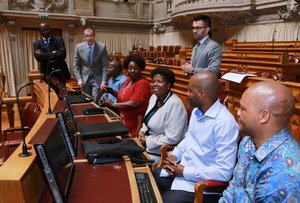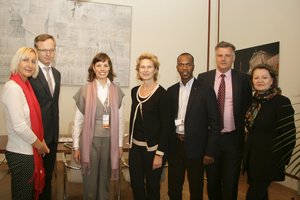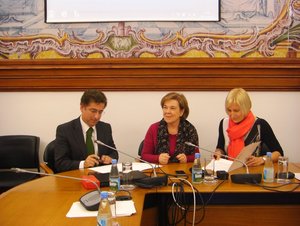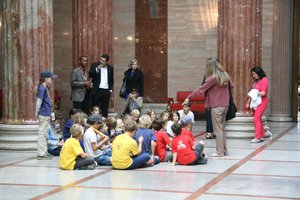10 years of parliamentary cooperation between Mozambique and Austria
The NorthSouth Parliamentary Dialogue of Parliaments (PNSD) was established in 2006 because of the need to strengthen partnership-based thinking and action between countries and institutions in the north and south, in order to tackle the manifold development challenges together. Mutual understanding is just as necessary as the creation of legal, coherent conditions in the north as well as in the south.
The fourth phase of the PNSD between the Austrian Parliament and the Assembleia da República (AR) of Mozambique was the final phase of the cooperation (2013-2016). The long-term partnership brought some significant results and experiences.
In co-operation with the parliament of Mozambique, two thematic areas soon emerged, in which the project activities were intensified over the years at the administrative parliamentary level: information and communication technologies (ICT) and public relations. The dialogue and cooperation between the Parliament and the civil society is still insufficiently developed in Mozambique, resulting in great information deficits on both sides. On the one hand, MPs are not sufficiently informed about the needs and concerns of their voters. On the other hand, civil society is not sufficiently informed of the role and importance of Parliament in a democratic society. The intensive cooperation between the public departments of the partner parliaments tried to increase the flow of information and transparency, for example through a concept for Guided Tours for Children in Parliament.
With the preparation of a strategy for ICT in Parliament during the project period 2010-2013, the NorthSouthDialogue project has made an important contribution to increasing the efficiency of the workings in the Mozambican Parliament. The creation of a strategy was, however, only a first step, followed by a targeted implementation of the measures, which was accompanied by the Parliamentary NorthSouthDialogue during the initial phase. Cooperation with (external) experts from the Austrian and Portuguese parliaments was of great importance.
The mentioned products of the partnership were the results of intensive peer-to-peer work, trainings and workshops in Vienna and Maputo. In addition, the ICT department was supported by the acquisition of servers and important software. The regular participation of Mozambican MPs in the project of the Austrian Parliament allowed an exchange also at the level of the parliamentary representatives.
Since 2010, the activities in the Mozambican Parliament have been carried out in the form of a trilateral partnership with the Parliament of Portugal. Due to the common history, it has a close relationship with the AR and was glad to get involved in the work of the project. This enabled synergies to be exploited, which had a positive effect on the implementation of the activities.
Some of the activities are described below.
June 2016 - On-the-job-Training to enhance productivity
Report by Isabel Nascimento
Developments in the field of ICT are very fast and hence it is necessary that parliamentary staff is constantly trained and updated, as their qualification reflects directly on the productivity of a parliament. On-the-job training meets the aforementioned needs for its practical content and for its conduct in a work context.
Among the objectives of the Mozambican Assembly (AR) is the support of training to meet future technical capacity requirements with the goal that the legislative and control duties of parliament can be effectively supported by ICT.
Thus, an on-the-job training of two technicians from the AR (Isabel Nascimento and Ambrósio Soares) was held in the Portuguese Parliament from the 4th to the 10th of June 2016. The training was part of the activities defined in the trilateral cooperation between the Parliament of Mozambique, Portugal and Austria within the framework of the NorthSouthDialogue programme. The focus of the training was on System Administration and Helpdesk Service.
In the area of System Administration topics of the training were functions, tasks and organization of the systems management team, the general characterization of the virtualization infrastructure of the Parliament, the demonstration of the BEP system, the technical infrastructure of the IT center as well as a visit to the Data Processing Center. Within the area of Helpdesk the design and function of the operating system was discussed. Basically, the help desk is the "face" of the computer center and its management is done using the various systems such as EasyVista. It can be seen as a complementary management support to the user. Topics of the trainings were a. o. the characterization of the Service Desk within the IT Centre of the Parliament, the design and specifications of its functions, the User Portal (EasyVista, ServiceDesk Plus), Remote Control to User (Bongar) and Software management and information.
From the programme's point of view, the objectives were achieved, although this was only one aspect of the real need of the IT staff of the Information Center of the Parliament of Mozambique (CIAR). Other issues of equal and great importance must also be taken into account - in particular the availability of technical infrastructure resources and financial viability. Both aspects make it currently impossible to actually apply all the knowledge acquired and allow good practice in ICT. Here the AR itself needs to strengthen its efforts to achieve the necessary results.
The NorthSouthDialogue programme allowed the acquisition and consolidation of knowledge and practical experience that will give us the possibility of acting in a more autonomous manner and consequently be more attentive to unexpected situations that may arise by responding quickly and appropriately. Thus, the two staff members, Isabel Nascimento and Ambrósio Soares want to thank all the partners within the NorthSouthDialogue programme, the Portuguese and Austrian Parliament but also the Austrian Development Cooperation as the donor, for the support given.
Better communication with the people through ICT - working visit of a Mozambican MP delegation

From May 18th to 25th representatives of the Committee on Social Affairs, Women's Affairs and Public Communication of the Assembleia da República visited the two partner parliaments in Portugal and Austria. The aim of the delegation visit was to obtain an overview of the benefits and challenges of ICT tools used to improve public participation in the parliamentary process in both countries.
Questions relating to the necessary internal organizational processes to include such tools in the parliamentary routine were addressed, i.e. what requirements and resources are necessary to implement and use such tools (financial, hardware, software, maintenance, human resources). Also, an analysis of how ICT can contribute to a change in parliamentary practice and facilitates the accountability of MPs was undertaken.
Resulting from the interesting exchanges and many discussions the Mozambican delegation was aware that before the implementation of ICT tools the IT infrastructure must be consolidated first. It is of particular importance to ensure sufficient funds and human resources for maintenance. The delegation will present the findings of the visit to the President of the Assembleia, Veronica Macamo, together with a report summarizing recommendations for next steps. Based on it, further activities will be defined.
June 2014 - Guided Tours through the parliament
The Public Relations Department of the Mozambican Parliament has started to offer and conduct guided tours through the parliament. Presently the focus groups of the tours are school classes and university students. Guided tours are being conducted two to three times a week. The demand for tours has increased considerably during the last year. The "Guided Tours Manual", which was developed in the cooperation with the Austrian collegues, is of essential assistance in terms of establishing the tours.
New concepts were developed and implemented. Currently four collegues are being trained in the areas of historical background of parliamentarism in Mozambique and legal procedures in the law making process. This will help to be able to answer any questions from the visitors. From October 2013 through to April 2014 around 1.015 people have visited the parliament. Their feedback is very positiv as they appreciate the opportunity to learn about the democratic processes and relationships of their country.
In future the guided tours will be one of the most important instruments for the parliament in terms of reaching out to its electorate and raise awarness among the citizens of Mozambique.
.
March 2014 - IT implementation and training
Based on a trilateral Memorandum of Understanding between Austria, Mozambique and Portugal two Portuguese collegues travelled to Maputo. The aim of the working visit was an on-the-job technical support and training of the Mozambican collegues in the ICT-department. The focus laid on the installation of a Helpdesk-Software and the training on how to manage technical faults and service enquiries.
October 2013 - Trilateral cooperation in the area of public realtions

The trilateral cooperation includes the parliaments of Austria, Mozambique and Portugal. In October the Austrian Parliament holds its open day. To be able to see and learn about all the necessary processes before and while this day, Mr. Oriel Chemane, the head of the Public Realtions department in the Mozambican Parliament visited Austria for a three weeks training. Also, Ms. Marlene Viegas, a collegue from the Portuguese Parliament, joined for a three days working visit.
The aim of the cooperation is to establish guided tours as a pivotal instrument in the curricula of schools in and around Maputo as part of a political education of pupils. The Portuguese parliament will focus on supporting the child adequate formulation of material in Portuguese.
Portugal

For the implementation of the ICT strategy in the Mozambican parliament the Portuguese Parliament could be obtained as a cooperation partner. Already in December 2012 a MOU was signed between the deputy director of the Portuguese parliament, José Manuel Araújo, and NorthSouthDialogue of Parliaments project coordinator Jutta Kepplinger. Among the major advantages that comes along is that the trainings can be held in Portuguese, the official language of Mozambique. Step by step the partner parliament will be adapted to the modern IT standards required.
Public Relations

Since years the Mozambican parliament tries to improve its public image. For this, the parliament has repeatedly called on different partners for trainings. Some experiments in the field of parliamentary tours for adults and children were also carried out, but analogous to the area of ICT, a coherent strategy was lacking. Only in cooperation with the public relations department of the Austrian parliament the task of creating an overall strategy of "opening the parliament to the public" has been undertaken. In the project phase 2010-2013 a manual for "Guided Tours for Children" was created in a series of workshops. Also, first steps towards designing an "open day" ("Portas Abertas") was made. However, further activities in the field of public relations as well as the implementation of measures for the opening of the parliament for its citizens are needed. In concrete terms, analogous to the best practice model in the Austrian parliament, also the Mozambican parliament will soon offer guided tours for school groups and organise an annual open day.
.
Kommentar von Oriel Chemane; Leiter der Abteilung Öffentlichkeit und Protokoll im mosambikanischen Parlament*

"Das abgelaufene On-the-job-Training im österreichischen Parlament ist für mich durchwegs positiv abgelaufen und war für mein Wissen und in Bezug auf praktische Erfahrungen in der parlamentarischen Öffentlichkeitsarbeit sehr bereichernd.
In Bezug auf die gesammelten Erfahrungen, gab es einige herausragende Aspekte. Einer davon ist sicherlich das Konzept des „Open House“, das das österreichische Parlament betreibt. Dieses hat eine ganz besondere Bedeutung für die Öffentlichkeit, aber auch für die Institution Parlament. Ich konnte die professionelle Organisation von Führungen für die breite Öffentlichkeit, aber auch für Schulklassen, inklusive aller Vor- und Nachbereitungsaufgaben miterleben. Dies beinhaltete auch eine Einsicht in die Didaktik der Vermittlung von Demokratie und des Demokratieverständnis bei Kindern und Jugendlichen, die eine optimale Form des Kontakts mit Kindern und Jugendlichen gewährleistet.
Wichtig war für mich auch das Erleben des Zusammenspiels der beteiligten Abteilungen, inklusive des Besucherzentrums, der protokollarische Umgang der Präsidentschaftskanzlei mit dem Konzept des „Open House“ und der praktizierte partizipative Führungsstil, insbesondere beim Management von Projekten und Humanressourcen.
Als mögliche Szenarien der Umsetzung meiner Erfahrungen sehe ich nach diesem Training die Konzeption eines Tages der offenen Tür im mosambikanischen Parlament, mit dem Schwerpunkt auf Führungen für die allgemeine Öffentlichkeit und auf eine Demokratieausstellung für Kinder und Jugendliche. Dazu ist natürlich eine Anpassung an die Realität im mosambikanischen Parlament notwendig, insbesondere in der Abteilung Öffentlichkeitsarbeit und Protokoll. Es gilt, die Organisation von Führungen und die generelle Event-Organisation klar zu verbessern, sich abteilungsübergreifend verstärkt zu vernetzen und auch das Know How der einzelnen Mitarbeiter_innen zu erhöhen. Entsprechende Schulungen in Bezug auf konkrete Fragen der Organisation und Umsetzung von Führungen ist notwendige Voraussetzung – auch um Workshops zur Demokratie und einen Tag der offenen Tür zu einem regelmäßigen Event werden zu lassen.
Mit der Unterstützung, die uns im Rahmen des Parlamentarischen NordSüdDialogs durch die Kolleg_innen vor allem aus Österreich, aber auch aus Portugal gewährt wird, bin ich jedoch zuversichtlich, diese Herausforderungen meistern zu können."
*Aus dem Portugiesischen übersetzt.

